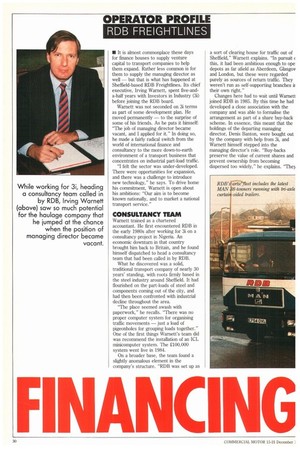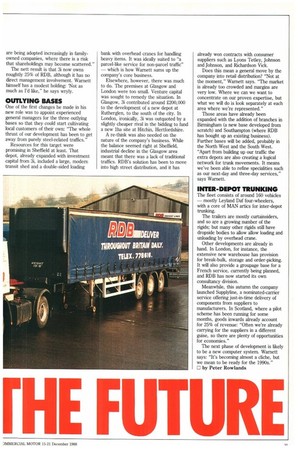N A NC NC
Page 24

Page 25

If you've noticed an error in this article please click here to report it so we can fix it.
THE FUTURE
• It is almost commonplace these days for finance houses to supply venture capital to transport companies to help them expand. Rather less common is for them to supply the managing director as well — but that is what has happened at Sheffield-based ROB Freightlines. Its chief executive, Irving Warnett, spent five-anda-half years with Investors in Industry (31) before joining the RDB board.
Warnett was not seconded on 3i terms as part of some development plan. He moved permanently — to the surprise of some of his friends. As he puts it himself: "The job of managing director became vacant, and I applied for it." In doing so, he made a fairly radical switch from the world of international finance and consultancy to the more down-to-earth environment of a transport business that concentrates on industrial part-load traffic.
"I felt the sector was under-developed. There were opportunities for expansion, and there was a challenge to introduce new technology," he says. To drive home his commitment, Warnett is open about his ambitions; "Our aim is to become known nationally, and to market a national transport service."
CONSULTANCY TEAM
Warnett trained as a chartered accountant. He first encountered RDB in the early 1980s after working for 3i on a consultancy project in Nigeria. An economic downturn in that country brought him back to Britain, and he found himself dispatched to head a consultancy team that had been called in by RDB.
What he discovered was a solid, traditional transport company of nearly 30 years' standing, with roots firmly based in the steel industry around Sheffield. It had flourished on the part-loads of steel and components coming out of the city, and had then been confronted with industrial decline throughout the area.
"The place seemed awash with paperwork," he recalls. "There was no proper computer system for organising traffic movements — just a load of pigeonholes for grouping loads together." One of the first things Warnett's team did was recommend the installation of an ICL minicomputer system. The £100,000 system went live in 1984.
On a broader base, the team found a slightly anomalous element in the company's structure. "ROB was set up as a sort of clearing house for traffic out of Sheffield," Warnett explains. "In pursuit ( this, it had been ambitious enough to ope depots as far afield as Aberdeen, Glasgov and London, but these were regarded purely as sources of return traffic. They weren't run as self-supporting branches ir their own right."
Changes here had to wait until Warnett joined RDB in 1985. By this time he had developed a dose association with the company and was able to formalise the arrangement as part of a share buy-back scheme. In essence, this meant that the holdings of the departing managing director, Denis Banton, were bought out by the company with help from 3i, and Warnett himself stepped into the managing director's role. "Buy-backs preserve the value of current shares and prevent ownership from becoming dispersed too widely," he explains. "Thej, are being adopted increasingly in familyowned companies, where there is a risk that shareholdings may become scattered."
The nett result is that 3i now owns roughtly 25% of RDB, although it has no direct management involvement. Warnett himself has a modest holding: `Not as much as I'd like," he says wryly.
OUTLYING BASES
One of the first changes he made in his new role was to appoint experienced general managers for the three outlying bases so that they could start cultivating local customers of their own: "The whole thrust of our development has been to get away from purely steel-related traffics."
Resources for this target were promising in Sheffield at least. That depot, already expanded with investment capital from 3i, included a large, modern transit shed and a double-sided loading bank with overhead cranes for handling heavy items. It was ideally suited to "a parcel-like service for non-parcel traffic" — which is how Warnett sums up the company's core business.
Elsewhere, however, there was much to do. The premises at Glasgow and London were too small. Venture capital was sought to remedy the situation. ln Glasgow, 3i contributed around £200,000 to the development of a new depot at Rutherglen, to the south of the city. In London, ironically, 3i was outquoted by a slightly cheaper rival in the bidding to fund a new lha site at Hitchin, Hertfordshire.
A re-think was also needed on the nature of the company's business. While the balance seemed right at Sheffield, industrial decline in the Glasgow area meant that there was a lack of traditional traffics. RDB's solution has been to move into high street distribution, and it has already won contracts with consumer suppliers such as Lyons Tetley, Johnson and Johnson, and Richardson Vick.
Does this mean a general move by the company into retail distribution? "Not at the moment," Warnett says. "The market is already too crowded and margins are very low. Where we can we want to concentrate on our proven expertise, but what we will do is look separately at each area where we're represented."
Those areas have already been expanded with the addition of branches in Birmingham (a new base developed from scratch) and Southampton (where RDB has bought up an existing business). Further bases will be added, probably in the North West and the South West. "Apart from building up our traffic the extra depots are also creating a logical network for trunk movements. It means we've been able to refine specialities such as our next-day and three-day services," says Warnett.
INTER-DEPOT TRUNKING
The fleet consists of around 160 vehicles — mostly Leyland Daf four-wheelers, with a core of MAN artics for inter-depot trunking.
The trailers are mostly curtainsiders, and so are a growing number of the rigids; but many other rigids still have dropside bodies to allow allow loading and unloading by overhead crane.
Other developments are already in hand. In London, for instance, the extensive new warehouse has provision for break-bulk, storage and order-picking. It will also provide a groupage base for a French service, currently being planned, and RDB has now started its own consultancy division.
Meanwhile, this autumn the company launched Supplyline, a nominated-carrier service offering just-in-time delivery of components from suppliers to manufacturers. In Scotland, where a pilot scheme has been running for some months, goods inwards already account for 25% of revenue: "Often we're already carrying for the suppliers in a different guise, so there are plenty of opportunities for economies."
The next phase of development is likely to be a new computer system. Warnett says: "It's becoming almost a cliche, but we mean to be ready for the 1990s." El by Peter Rowlands










































































